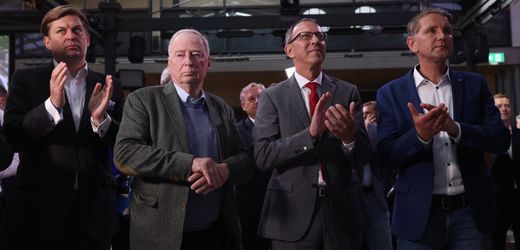
It was the great hope of the far right in the AfD: In Saxony-Anhalt they wanted to set a fanal. If the party becomes the strongest force, Björn Höcke recently proclaimed in Merseburg, this is a “historical sign”. The Thuringian head of the AfD made many appointments in the neighbouring state of Saxony-Anhalt.
On election night, there was no more talk of such a sign for the federal state and the republic.
The AfD, according to initial projections in ARD and ZDF, probably remains below its 2016 result, at that time it gained 24,3 percent. There was only one consolation for the campaigners: the state party, which is far to the right within the AfD cosmos, became the second strongest force for the second time in a row.
When the first forecast ran on the screens at the AfD election party in Magdeburg, the body language of the party celebrities present also reflected the disappointment: Höcke applauded rather dutifully, just like the Saxon state head Jörg Urban standing next to him. The AfD honorary chairman Alexander Gauland, who also arrived, seemed almost unmoved – there was no sign of exuberant cheering.
Not on site in the state capital was the AfD co-chairman Jörg Meuthen, who has been at odds with Gauland and Höcke since last May over the orientation of the AfD. In contrast to internal rival and co – party leader Tino Chrupalla, Meuthen had not made any campaign appearances in Saxony-Anhalt anyway. The national association had not invited him, as it was called internally.
Meuthen was also not present on television on election night, but commented on the outcome via the news agency: The result was “overall good and respectable”, after all, one was confirmed as the second strongest party.
After this rhetorical bow to the campaigners, however, Meuthen could not resist an indirect blow against the ultra-right camp in the AfD. In view of the” clearly desolate condition of the competition”, especially of the CDU, however, in his view,”an even stronger result would have been possible with a more centrist election campaign, less relying on protest alone”. This must now be analysed within the party, demanded Meuthen.
Other explanations were tried on the spot. The Saxony-Anhalt AfD top candidate Oliver Kirchner, whom the crisis of the state association in 2018 had brought up the then and now resigned from the party state and faction leader André Poggenburg, spoke of a five – year “agitation” against his party, in which he ranked “the churches” in addition to “the media”.
Kirchner did not want to know anything more about the internally nourished hope of a victory over the CDU. “I had not given out the goal, “he said defiantly in ZDF, he had always spoken internally only of a possible result between” 23 and 26 percent”. For the Spitzenkandidaten, one thing was particularly important: they were ” People’s Party “and had taken away” the workers ” from the Left Party – in fact, the party was able to score points here again.
Kirchner, but also Chrupalla fabulated on election night of a “conservative majority” in Saxony-Anhalt. Chrupalla was ” very satisfied “with the result, the citizens wanted”a government of CDU and AfD”.
But such claims of the AfD did not stand up to closer scrutiny: According to a survey by the research group Elections for the ZDF, 91 percent of CDU supporters were against cooperation with the AfD. The number on this election evening thus impressively supported the course of the CDU Prime Minister Reiner Haseloff, who strictly rejects cooperation with the AfD.
Höcke also looked for explanations. He gave a short interview to the association” One Percent”, a group that is observed by the Verfassungsschutz as a right-wing extremist suspected case. It was a “great result” under extremely difficult conditions, the established media had “really tried everything” to “write bad” the AfD.
Quite in the mode of the inner-party power struggle, he also criticized the rather meaty results of his AfD colleagues in the past state elections in Rhineland-Palatinate and Baden-Württemberg, in which the party had to accept losses. “The East,” right-wing extremist Höcke claimed, ” stands.«


